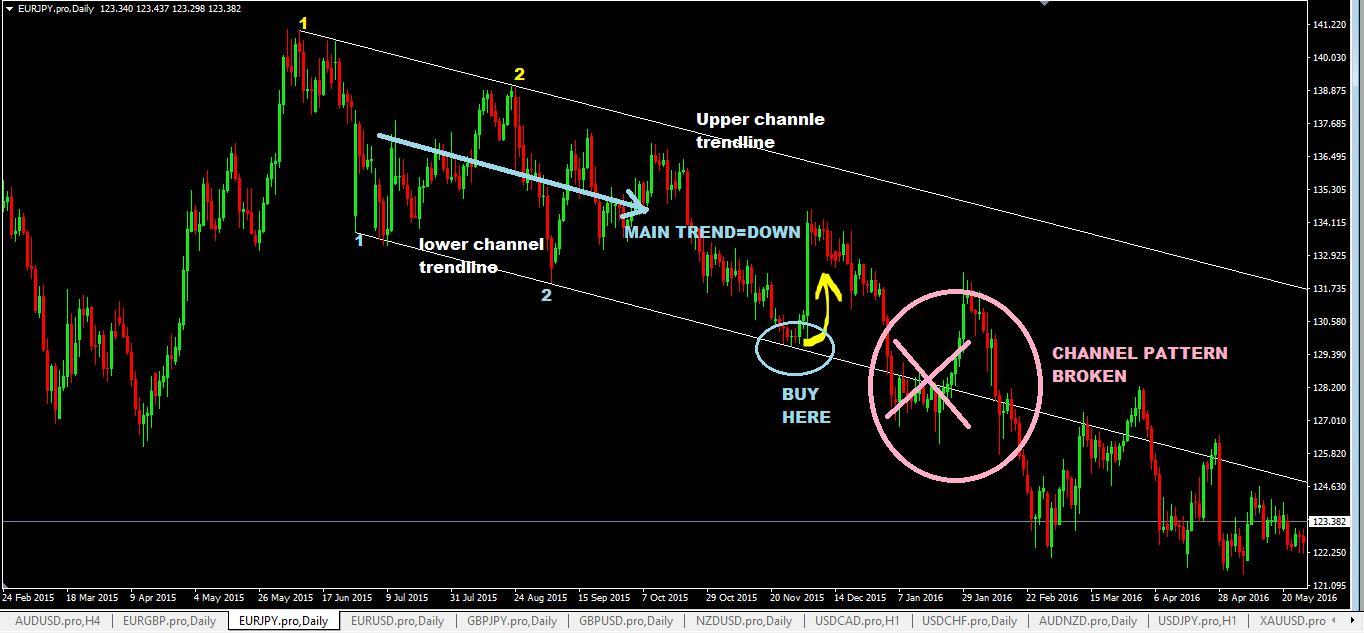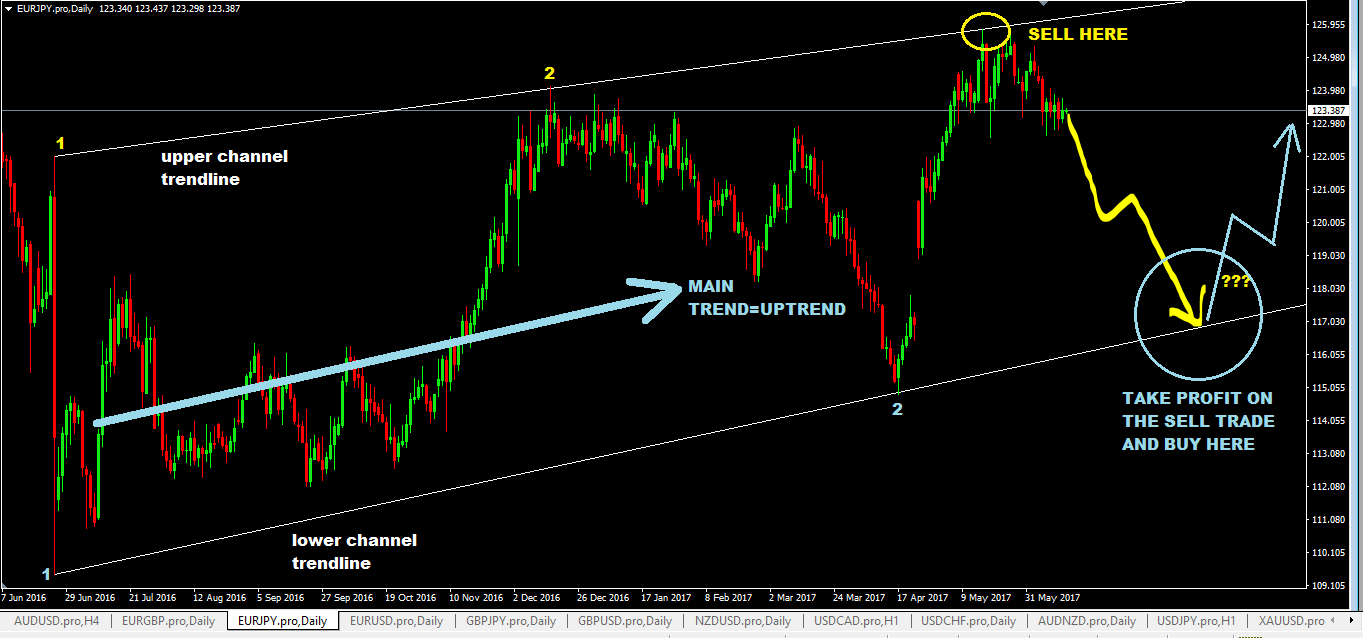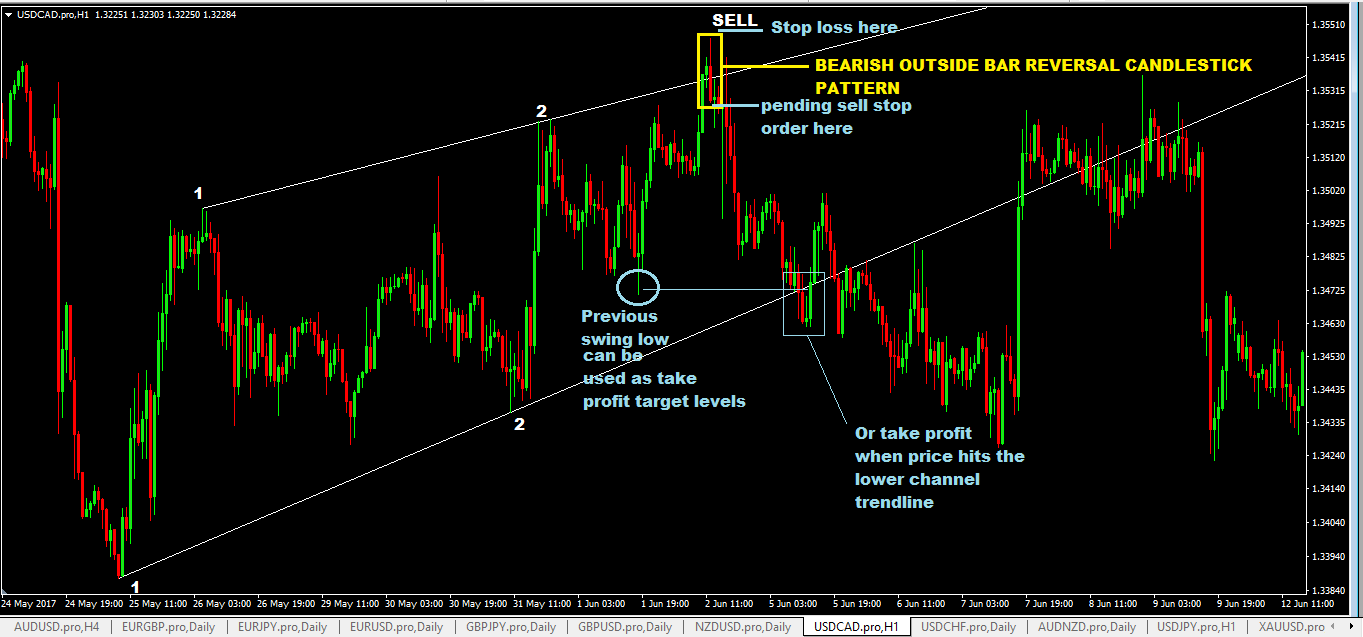The diagonal price channel forex trading strategy is another price action trading system where the pattern you should be looking for is a diagonal channel pattern.
All you need is a good eye for picking peaks and bottoms and drawing two trendlines, the upper channel trendline and the bottom channel trendline.
There are two main types of diagonal price channel patterns:
- the bearish diagonal price channel pattern. This forms when the market is in a downtrend
- the bullish diagonal price channel pattern. This forms when the market is in an uptrend.
This chart below shows and example of a diagonal price channel that was forming in a downtrend until the channel pattern got broken making it null an void:

This chart below shows a diagonal chart pattern that was forming in an uptrend and at the moment of this writing, that channel is still valid:

How Do You Draw A Diagonal Price Channel?
Drawing a diagonal price channel is similar to drawing trendlines.
You just need a minimum of 2 peaks to draw the upper channel trendline and a minimum of 2 lows to draw the lower channel trendline.
Ideally, you want to see that those two trendlines you’ve drawn are almost parallel to each other but sometimes, a little bit of angle on one of the trendlines is still ok.
Currency Pairs You Can Trade?
Any currency pairs can be trading with the diagonal price channel forex trading strategy.
What Timeframes Can You Trade In?
I suggest you use 15 minute timeframe and upwards.
Are any Forex Indicators Required?
Some forex traders will try to make things complicated by adding a few more indicators here but don’t do that. What I suggest is just study and know bullish and bearish reversal candlestick patterns for better trade entry signals.
Diagonal Price Channel Trading Strategy Rules
Refer to this chart below showing a sell trade setup on 1hr timeframe on USDCAD for the rules on trading diagonal price channels:

Where To Buy And Sell On The Diagonal Price Channel?
Here are the interesting things about trading diagonal price channels:
- even if the trend is down, you can buy when the price touches the lower channel….or, if the price touches the upper channel, you can also sell.
- similarly, if the trend is up, if the price touches the upper channel, you can sell and if it touches the lower channel trendline, you can buy.
Please refer to the two charts shown above.
Best Signal On Diagonal Price Channel Trendlines?
The best way to trade diagonal channels is to use bullish and reversal candlestick patterns like pin bars, insider bars, bearish or bullish haramis, bearish or bullish railway track patterns, piercing line etc.
Where To Take Profits?
Ideally, you’d like to take off profits when the price hits the other channel trendline but guess what?
Things always don’t happen that way so you should be prepared to take profits along the way when you risk:reward is 1:3 achieved or maybe use the nearest swing high/swing low as your take profit target.
Or you may decide to trail stop behind subsequent lower swing highs for a sell order and higher swing lows for a buy order as the price moves in favor of your trade to ride out the trend within the price channel.
Best Place To Place Your Stop Loss?
Just outside of the price channel and how many pips away? It really depends. If you use reversal candlesticks to enter your trades, then 5-20 pips may be adequate, or increase the size a little bit more if you think that is too close to the current market price and you may get stopped out prematurely.
Advantages of The Diagonal Price Channel
- One of the forex trading strategies with excellent risk/reward ratio
- Potential for very tight stop loss which can also allow you to pyramid your way to increased profits (adding more trades along the way)
- The use of reversal candlesticks as signals to buy or sell really enhances this forex system.
Disadvantages of The Diagonal Price Channel
- New forex traders may find it hard to spot and draw channels initially but with more chart time and practice, it gets better.
- Diagonal price channels get broken…they are not a line drawn in concrete.
Please don’t forget to share this with your friends.